- From Vision to Reality: Assessing the Feasibility of One Nation, One Election in India February 22, 2024
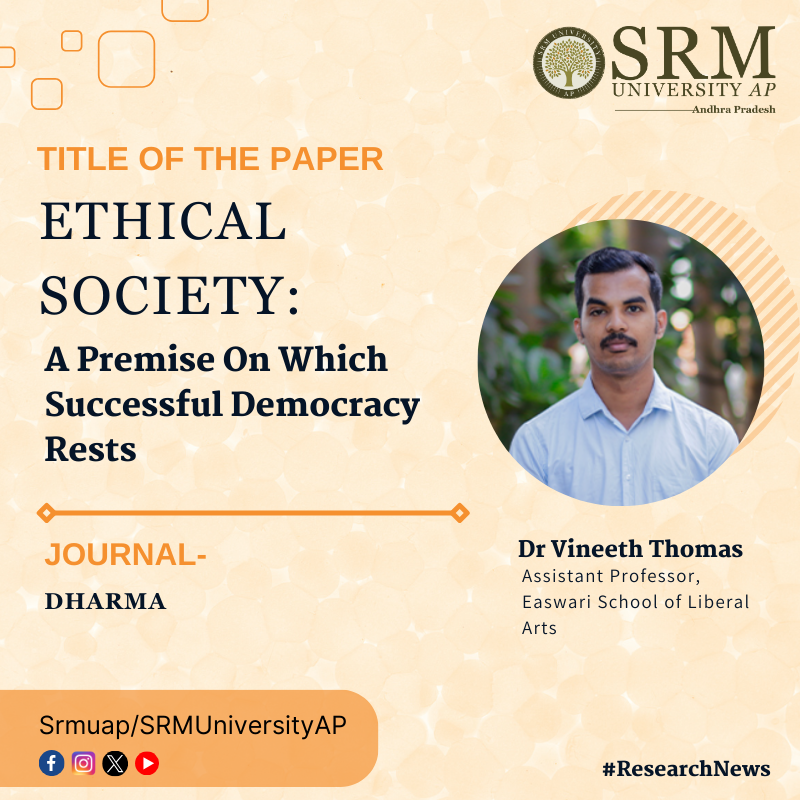
In the grand spectacle of democracy, every ballot cast represents a pivotal moment in shaping the collective destiny of a nation. However, what happens when the destiny of 1.4 billion people lacks a solid foundation of values and ethics?
Dr Vineeth Thomas, Assistant Professor at the Department of Liberal Arts, in his research paper titled “Ethical Society: A Premise On Which Successful Democracy Rests”, delves into these complexities of democratic regression that threaten to shake the foundations of our political system.
ABSTRACT:
Samuel Phillips Huntington’s thesis on the ‘Third Wave’ of democratisation, as presented in his seminal work “The Third Wave: Democratization in the Late Twentieth Century”, posited democracy as the preeminent and widely accepted form of governance. While democracy may prevail quantitatively in contemporary times, it grapples with numerous challenges in terms of its qualitative aspects. This research article identifies the absence or dearth of ethical values as a significant factor contributing to the erosion of democracies worldwide. Moreover, this erosion has the potential to incite a ‘new wave against democracy’. Consequently, this article aims to explore the potential remedy for this issue by anchoring democracy in an ethically conscious society. We contend that an ethically grounded society serves as a fundamental prerequisite for nurturing a high-quality and prosperous democracy, ultimately acting as a formidable barrier against the imminent and looming threats to democratic systems.
The link to the article
Continue reading → - A Scholarly Perspective on Incumbency to Dominance January 24, 2024
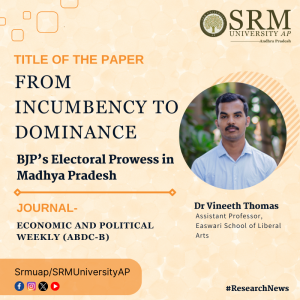 We are pleased to announce the publication of an insightful article titled “From Incumbency to Dominance: BJP’s Electoral Prowess in Madhya Pradesh,” in the prestigious ABDC-B journal, Economic and Political Weekly (EPW). This article, authored by Dr Vineeth Thomas, Assistant Professor in the Easwari School of Liberal Arts provides a comprehensive analysis of the BJP’s journey from being an incumbent party to establishing dominance in the state’s political landscape.
We are pleased to announce the publication of an insightful article titled “From Incumbency to Dominance: BJP’s Electoral Prowess in Madhya Pradesh,” in the prestigious ABDC-B journal, Economic and Political Weekly (EPW). This article, authored by Dr Vineeth Thomas, Assistant Professor in the Easwari School of Liberal Arts provides a comprehensive analysis of the BJP’s journey from being an incumbent party to establishing dominance in the state’s political landscape.Dr Thomas examines the factors that have contributed to the BJP’s electoral success in Madhya Pradesh, including the party’s organisational strength, leadership, and strategic alliances. The article also delves into the impact of various government policies and initiatives on the BJP’s electoral performance in the state.
Dr Thomas’s expertise in political analysis and his meticulous approach to the subject matter make this article a significant contribution to the scholarly discourse on Indian politics, particularly within the context of Madhya Pradesh. This research also enriches our understanding of contemporary political landscapes and aligns with our commitment to academic excellence.
Congratulations to Dr Vineeth Thomas for this impactful contribution to political scholarship!
Abstract
In the 2023 Madhya Pradesh Assembly election, the Bharatiya Janata Party (BJP) emerged victorious with a landslide majority. This electoral triumph, characterised by a significant mandate for the BJP, has undoubtedly reshaped the political dynamics of Madhya Pradesh. The landslide victory underscores the party’s stronghold in the region and signals a decisive mandate for the BJP to govern the state for the designated term. In this context, this article analyses various strategic factors that cleared the BJP’s path from incumbency to dominance in Madhya Pradesh.
Explanation of Research in Layperson’s Terms
In the dynamic landscape of Indian politics, Madhya Pradesh stands as a crucible of electoral battles, where the ebb and flow of political tides have shaped the destiny of the state. At the heart of this electoral competition lies the Bharatiya Janata Party (BJP), an entity that has not only weathered the storm of time but has also evolved from being a political contender to establishing unwavering dominance in Madhya Pradesh.
The 2023 Madhya Pradesh Assembly election results revealed a clear mandate in favour of the BJP, securing an impressive 164 out of the total 230 seats. The overwhelming success is underscored by its triumph across different regions of the state. This comprehensive victory is particularly pronounced in the Malwa-Nimar region, which holds significant tribal populations. In this crucial area with 66 seats, the BJP secured a dominant 45 seats, leaving the Congress trailing with 20 seats, while the Bahujan Adhikar Party (BAP) clinched a lone seat. The BJP’s prowess is further evident in the Bundelkhand region, where it nearly swept the electoral landscape, securing 21 out of 26 seats, while the Congress was left with just five. Similarly, in the Vindhya region, the BJP emerged victorious in 25 out of 30 seats, leaving the Congress with a mere five. This regional dominance is a testament to the party’s strategic appeal and resonant policies. The saffron wave extended to Madhya Bharat, where the BJP outshone the Congress by winning a staggering 33 out of 36 seats (Malpani,2023). This substantial margin of victory indicates not only the party’s organisational strength but also its ability to connect with the electorate on a regional level.
So, how did the BJP complete the journey from a party in power to a political behemoth that has left an indelible mark on the state’s political canvas? A close examination in this regard unravels the fact that it is the conglomeration of clearly designed multiple tactics which gave the BJP a winning formula in the 2023 Madhya Pradesh assembly elections
Title of the Research Paper in Citation Format
Saravanan, Vineeth & Avunii, From incumbency to dominance. (2024, January 5). Economic and Political Weekly.
Practical Implementation/ Social Implications of the Research
Policy makers and politicians can make prudent decision about one nation one election
Collaborations
Electoral Politics, ethics, commonwealth
Future research plans
Indian govt and politics
Continue reading → - Paper Presented at the NIAS Conference in Amsterdam December 11, 2023
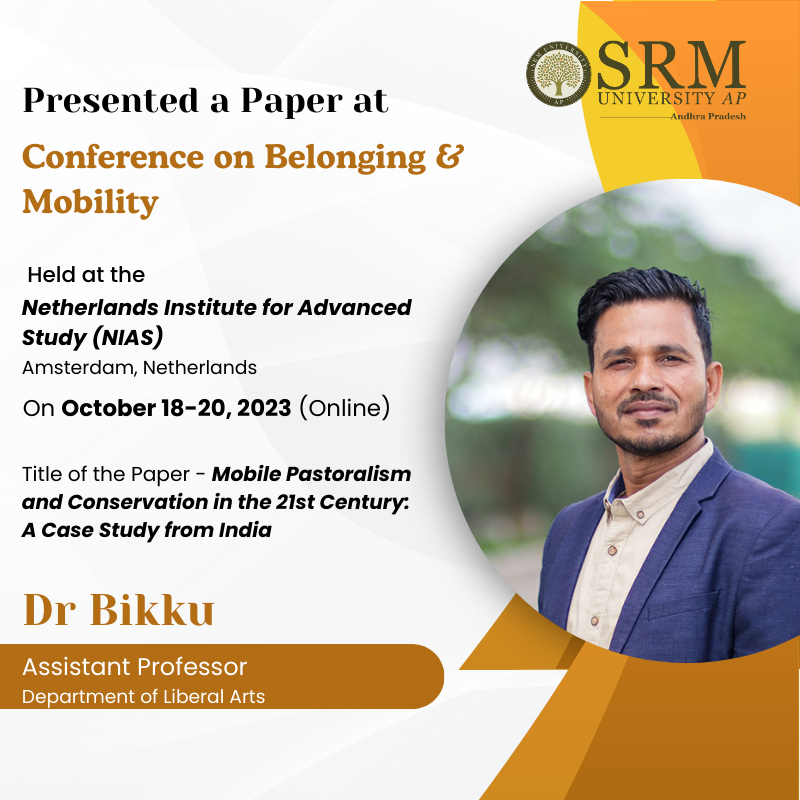
Dr Bikku, Assistant Professor, Department of Liberal Arts has presented a paper titled “Mobile Pastoralism and Conservation in the 21st Century: A Case Study from India” at the NIAS Conference on Belonging & Mobility, held at the Netherlands Institute for Advanced Study (NIAS), Amsterdam, Netherlands on October 18-20, 2023 (online).
Congratulations to Dr Bikku for this remarkable achievement. SRM AP immense pride in the success of its faculty and scholars and applauds their unwavering commitment to scientific excellence and societal impact!
Abstract
The study focuses on the struggle of nomadic pastoralists to continue their traditional occupation of raising livestock at different landscapes in the face of the shifting political ecology in India. Pastoralism is a traditional subsistence livelihood pattern that involves raising domestic animals in different pastures. For pastoralists to use continually shifting resources in a variety of ecological landscapes, mobility is an effective strategy. However, the current conservation approach has colonial roots and reinforces biodiversity conservation by establishing and enforcing protected areas in several countries around the globe. Scientific conservationists and states have often seen pastoralism responsible for environmental degradation and wildlife decline through over-grazing and resource competition, respectively. As a result, the customary rights of the various pastoralist groups have been denied inside and outside the protected areas.
The paper investigates the current global conflicts between pastoralism and conservation. It also emphasises the changing dimensions of mobile pastoralism and conservation policies in India. By challenging the conservationists’ and the state’s preconceived notions about pastoralism, the Raika mobile pastoralists of Rajasthan, India, provide sustainable pastoralism and nature conservation through evidence of the coexistence of pastoralism and multispecies.
Continue reading → - Exploring the Dynamics of Democracy and Foreign Policy November 29, 2023
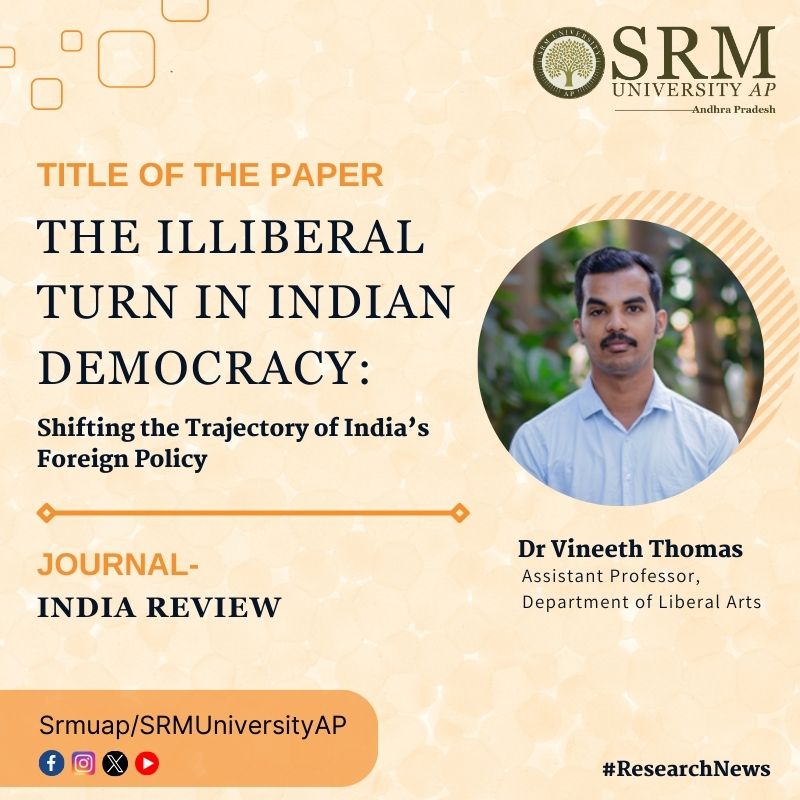
Dive into the intricate realms of Indian democracy and its ever-evolving foreign policy with a compelling research paper by Dr Vineeth Thomas, Assistant Professor, Department of Liberal Arts. The university is happy to announce the publication of Dr Thomas’ latest work, titled “The Illiberal Turn in Indian Democracy: Shifting the Trajectory of India’s Foreign Policy“, in the prestigious Q2 Journal “India Review“.
The paper is a profound exploration of the dynamic shifts in India’s foreign policy, drawing attention to the complexities of the nation’s democratic journey. His research delves into the nuanced interplay of domestic politics and global diplomacy, providing fresh perspectives on the illiberal turn in India’s democratic trajectory. The insightful work takes on a thought-provoking journey into the evolving facets of Indian democracy and the intricate interplay between domestic politics and foreign policy.
Abstract
Long-standing democracies such as India were not exempt from the global trend of democratic retreat. India has come under increasing international attention due to certain domestic policies such as the revocation of Article 370 of the Indian Constitution, the National Register of Citizens and Citizenship (Amendment) Act passed under the Bharatiya Janata Party government. In addition to India’s democratic decline being reflected in global democratic rankings, this has induced strains on India’s foreign relations. In its pursuit of becoming a leading power, India’s perceived democratic backsliding is likely to influence the direction of its foreign policy. To discern the impact of its perceived illiberal turn on its foreign engagement, the role of democracy in India’s foreign policy needs to be explored. While attempts have been made to understand democratic backsliding through a theoretical lens, the impact of a nation’s democratic status on its foreign relations and policy remains a largely unexplored area.
This study will help to understand how India’s democratic backsliding can induce a shift in its foreign policy.
Continue reading → - Secularity Unveiled: A Critical Analysis by Prof. Vishnupad November 20, 2023
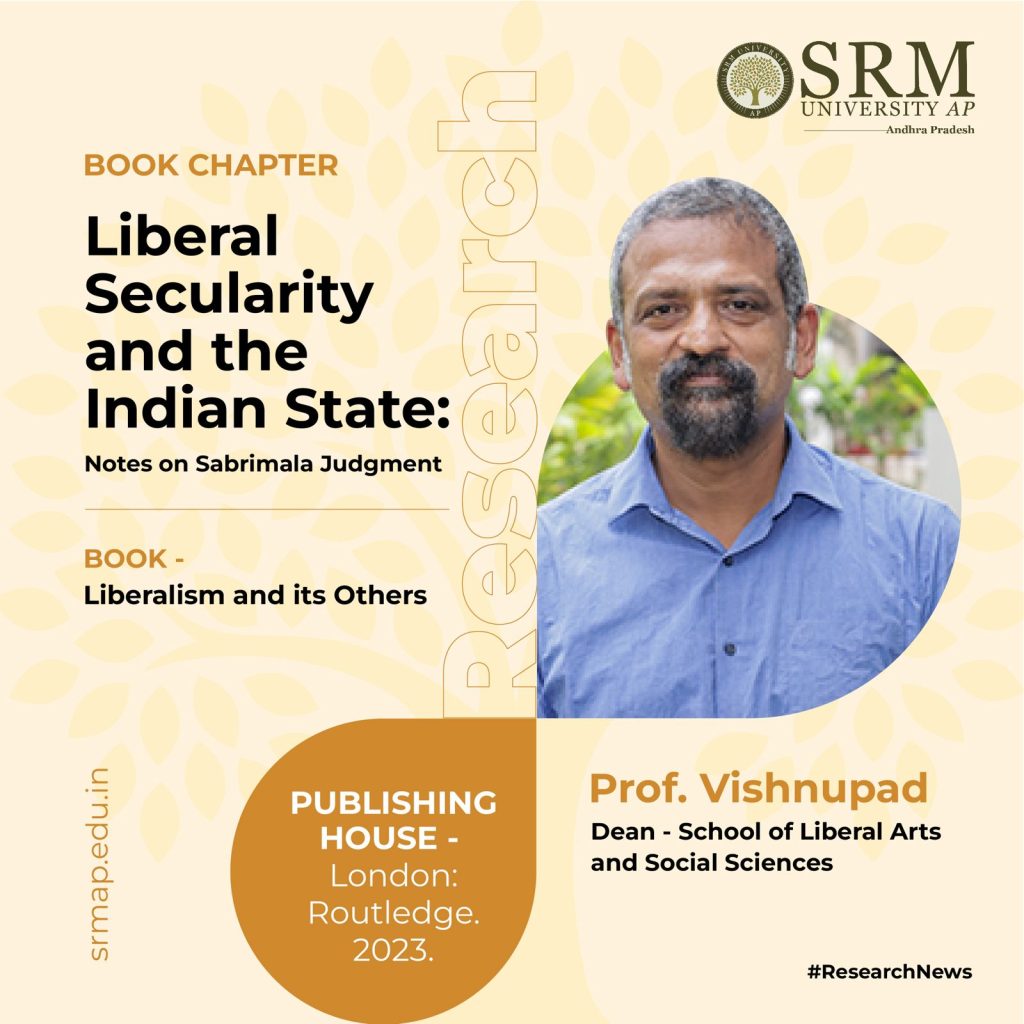
Prof. Vishnupad, Dean – Easwari School of Liberal Arts, has published his latest book chapter, “Liberal Secularity and the Indian State: Notes on the Sabrimala Judgment,” in the prestigious book “Liberalism and its Others”. The intriguing essay explores the complexities of modern secularity in liberal and postcolonial governments and navigates the delicate tango between the political and the religious. The book chapter is a scholarly investigation that maintains the importance of politics over religion while addressing the intricate dynamics of distance to closeness, neutrality to autonomy, and tolerance to publicity. Prof. Vishnupad challenges traditional knowledge, pushing to embrace ethical secularity’s dedication to discourse, transcending political and religious hierarchies.
This stimulating work is a light of intellectual engagement that will affect discussions in the fields of political philosophy, liberalism, and the state’s relationship with religion. Dive deep into these issues as we consider the nexus between politics and faith.
Continue reading →

